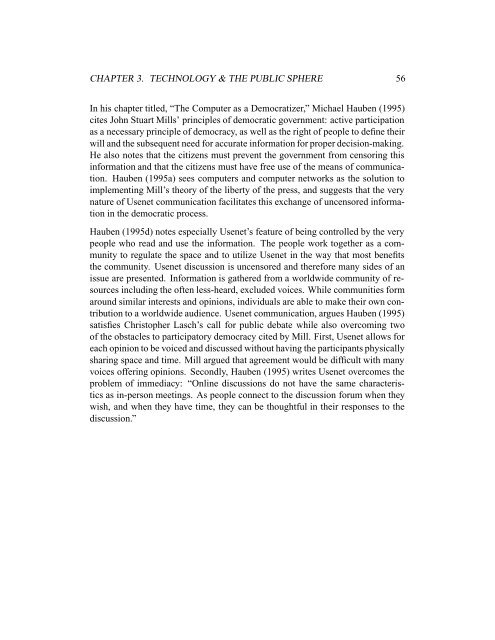Expanding the Public Sphere through Computer ... - ResearchGate
Expanding the Public Sphere through Computer ... - ResearchGate
Expanding the Public Sphere through Computer ... - ResearchGate
You also want an ePaper? Increase the reach of your titles
YUMPU automatically turns print PDFs into web optimized ePapers that Google loves.
CHAPTER 3. TECHNOLOGY & THE PUBLIC SPHERE 56<br />
In his chapter titled, “The <strong>Computer</strong> as a Democratizer,” Michael Hauben (1995)<br />
cites John Stuart Mills’ principles of democratic government: active participation<br />
as a necessary principle of democracy, as well as <strong>the</strong> right of people to define <strong>the</strong>ir<br />
will and <strong>the</strong> subsequent need for accurate information for proper decision-making.<br />
He also notes that <strong>the</strong> citizens must prevent <strong>the</strong> government from censoring this<br />
information and that <strong>the</strong> citizens must have free use of <strong>the</strong> means of communication.<br />
Hauben (1995a) sees computers and computer networks as <strong>the</strong> solution to<br />
implementing Mill’s <strong>the</strong>ory of <strong>the</strong> liberty of <strong>the</strong> press, and suggests that <strong>the</strong> very<br />
nature of Usenet communication facilitates this exchange of uncensored information<br />
in <strong>the</strong> democratic process.<br />
Hauben (1995d) notes especially Usenet’s feature of being controlled by <strong>the</strong> very<br />
people who read and use <strong>the</strong> information. The people work toge<strong>the</strong>r as a community<br />
to regulate <strong>the</strong> space and to utilize Usenet in <strong>the</strong> way that most benefits<br />
<strong>the</strong> community. Usenet discussion is uncensored and <strong>the</strong>refore many sides of an<br />
issue are presented. Information is ga<strong>the</strong>red from a worldwide community of resources<br />
including <strong>the</strong> often less-heard, excluded voices. While communities form<br />
around similar interests and opinions, individuals are able to make <strong>the</strong>ir own contribution<br />
to a worldwide audience. Usenet communication, argues Hauben (1995)<br />
satisfies Christopher Lasch’s call for public debate while also overcoming two<br />
of <strong>the</strong> obstacles to participatory democracy cited by Mill. First, Usenet allows for<br />
each opinion to be voiced and discussed without having <strong>the</strong> participants physically<br />
sharing space and time. Mill argued that agreement would be difficult with many<br />
voices offering opinions. Secondly, Hauben (1995) writes Usenet overcomes <strong>the</strong><br />
problem of immediacy: “Online discussions do not have <strong>the</strong> same characteristics<br />
as in-person meetings. As people connect to <strong>the</strong> discussion forum when <strong>the</strong>y<br />
wish, and when <strong>the</strong>y have time, <strong>the</strong>y can be thoughtful in <strong>the</strong>ir responses to <strong>the</strong><br />
discussion.”
















